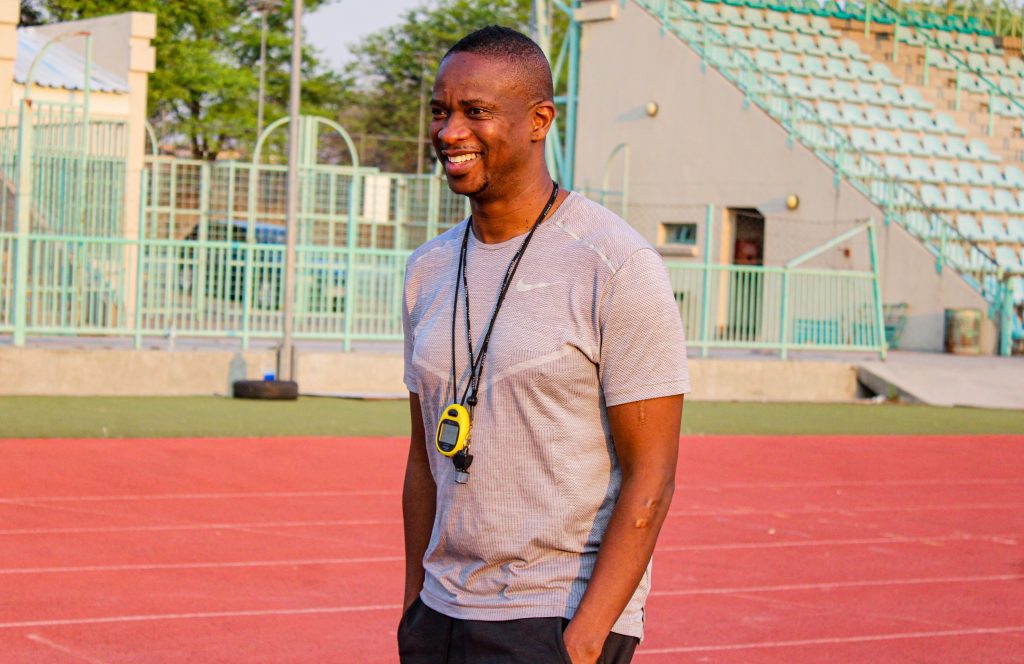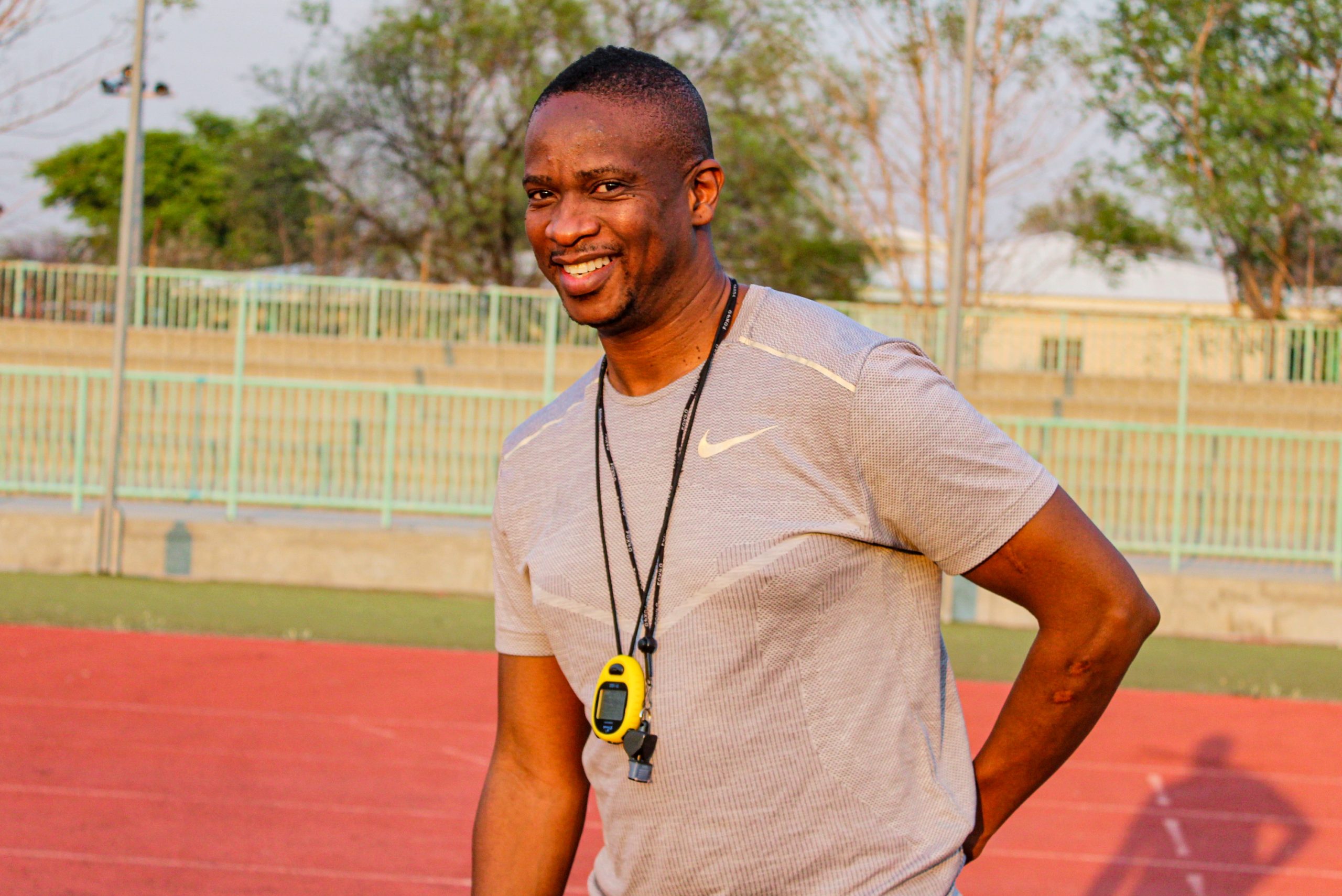One can make a difference in any role.
“You don’t have to be in a position of power to make a difference in peoples’ lives. You can do your bit with the little you have,’’ says Mosimanyane.
Kebonyemodisa Dose Mosimanyane made the above observation with conviction. The award-winning athletics coach holds dearly the role to develop young athletes. Under his tutelage, young athletes, some of whom were on the verge of giving up their long held dreams to become professional witnessed their fortunes bear fruits as Mosimanyane transformed them into prolific competitors.
Mosimanyane is more than just a coach. He is a transformational figure who has gone to great lengths to scout for those in need, ensure their welfare and give them hope. Through his work, young athletes from far-flung places are now living their dreams because he discovered their potential and guided them to excellence. Contrary to what most believe that one can only make a difference while in a high position of power, Mosimanyane learnt to do big things with less. His mission, “Is to cultivate, nurture and bring to light the talent this country has.”
The Road to Coaching.
The path to coaching was not a straightforward affair for Mosimanyane. During an event he had co-organized to promote tourism in Maun, he spotted two talented athletes who were participating in a marathon that was part of the event. Impressed by their performance, he decided he would support them. For instance, he supported them with training attire, accommodation and transport to various competitions in the country.
“These guys outperformed everybody. However, I realized they didn’t have the necessary equipment to compete. So, occasionally I helped them with training attire and equipment. Some professional athletes that I know donated some used training gear which I gave to these young athletes,” said Mosimanyane.

Accordingly, the athletes introduced Mosimanyane to their local athletics club coaches, which Mosimanyane later joined. Understudying the two coaches, he was able to assist them with basic coaching tasks. Mosimanyane said through the help of the two athletes, he identified more athletes who had completed secondary school studies but idle.
Subsequently, in 2016 he visited one of Botswana’s top athletes, who resided in South Africa at the time. Mosimanyane had an opportunity to interact with the athlete’s coaches who shared information with him on sprint and developing training programs. Encouraged by the exposure and the reception, Mosimanyane availed resources for the athletes to participate in South African competitions.
![]() “During the competitions, four athletes did very well against highly resourced and well-trained South African athletes. The coaches that I had met on my previous visit developed interest in our training methods and sent one of their Professors to Maun to study them. Through the exercise, he discovered that our main secret was the good relationship we had with our athletes. Despite that, our local coaches didn’t have coaching qualifications whatsoever,” Mosimanyane explained.
“During the competitions, four athletes did very well against highly resourced and well-trained South African athletes. The coaches that I had met on my previous visit developed interest in our training methods and sent one of their Professors to Maun to study them. Through the exercise, he discovered that our main secret was the good relationship we had with our athletes. Despite that, our local coaches didn’t have coaching qualifications whatsoever,” Mosimanyane explained.
After the interaction, the professor offered Mosimanyane an opportunity to attend a coaching training in South Africa. Self-sponsored, he and two other individuals attended the training and attained certification. Asked why he didn’t look for sponsors to foot the bill on his behalf, Mosimanyane ‘s response was:
“I didn’t look for sponsors at the time because when something is that small, it is difficult to sell it. You must do the spade work first. My advice to those who are starting projects is that they should work hard and ask for help when results are tangible.”
As he gained experience, he began to take on other challenging roles. As a result, when one of the coaches relocated to another town, Mosimanyane became the substantive coach, while the other coach focused on the junior team. On the other hand, Mosimanyane coached the senior team.
To improve the competitive levels and winning prospects for the athletes, Mosimanyane sent the team for more competitions in the city for exposure. The athletes did not believe they could perform better than city ones.
“Maun athletes didn’t believe they could beat Gaborone athletes. We had to change that mindset. In 2018, one of the athletes participated in the Gaborone International Meet Run and won it,” Mosimanyane pointed out.
With the improved performance and repertoire the Maun team had developed, Mosimanyane became comfortable to look for sponsors to finance the development of athletes. His efforts bore fruits in 2018, when Tjabutjabu Heritage Society from Maun and Mosimanyane friends came on board as sponsors. Furthermore, the prolific performance of the team sparked the interest of many, including the Botswana Athletics Association which recruited him into role of national coach.
In 2019, at the All-Africa Games in Morocco, Mosimanyane led the national athletics team to victory on many fronts. Further, in 2020 Mosimanyane walked away with a Coach of The Year award accorded to him by Botswana National Sports Council in recognition of his outstanding effort.
“At the All-Africa Games I was the team’s Head Coach. Despite that it was my first Championship competition, our team won two Gold Individual Medals, one Relay Gold Medal and Silver Medal. I consider it an achievement and a highlight of my career,” Mosimanyane said.
Mosimanyane says the award has strengthened his resolve to continue developing young athletes. His ultimate dream is to produce athletes at the level of renowned international ones.
“I believe that under the right conditions, the talent we have can rise to the level of Jamaican or USA athletes. We have to create the conditions to enable our athletes to compete at a high level.” Mosimanyane also said.
Quizzed on why he works without a salary, Mosimanyane responded :
“The love for coaching and the relationships I have developed with the athletes keeps me going. In coaching, I found something that I can do to help people. It doesn’t feel like it’s a job to me.”
Key Learnings
1. Don’t quit, help might be around the corner.
When chips are down, sometimes all one thinks of is quitting. Take a leaf from Mosimanyane’s advice that help might just be around the corner. Don’t quit!
2. Small roles can be a gateway to bigger roles.
Do not underestimate the power of a small role. Perform the role with the utmost seriousness and commitment. In this case, Mosimanyane’s role to assist coaches helped him ascend to a higher one of being a national coach.
3. Build First, Ask for Help Later
One must do the spade work first. Mosimanyane advises those starting projects to work hard and ask for help when results are tangible and visible. Furthermore, sponsors are interested in assisting to impact lives rather than an individual. Mosimanyane and his team developed athletes and are not in it for themselves but for developing their community.
4. Networking is key for progress
Networking opens doors for opportunities. It is through networking that Mosimanyane met other coaches both in Maun and South Africa. He was given a training opportuning which he took advantage of. Networking with other coaches therefore bore fruit for his team. Those seeking to bring change must network with their peers undertaking similar roles elsewhere.
5. Ideas spawn other ideas.
As it is said, the top of one mountain is the bottom of another. Look for opportunities within initiatives you are currently undertaking. It was through Mosimanyane’s previous initiative that the opportunity for yet another big mission came about.


